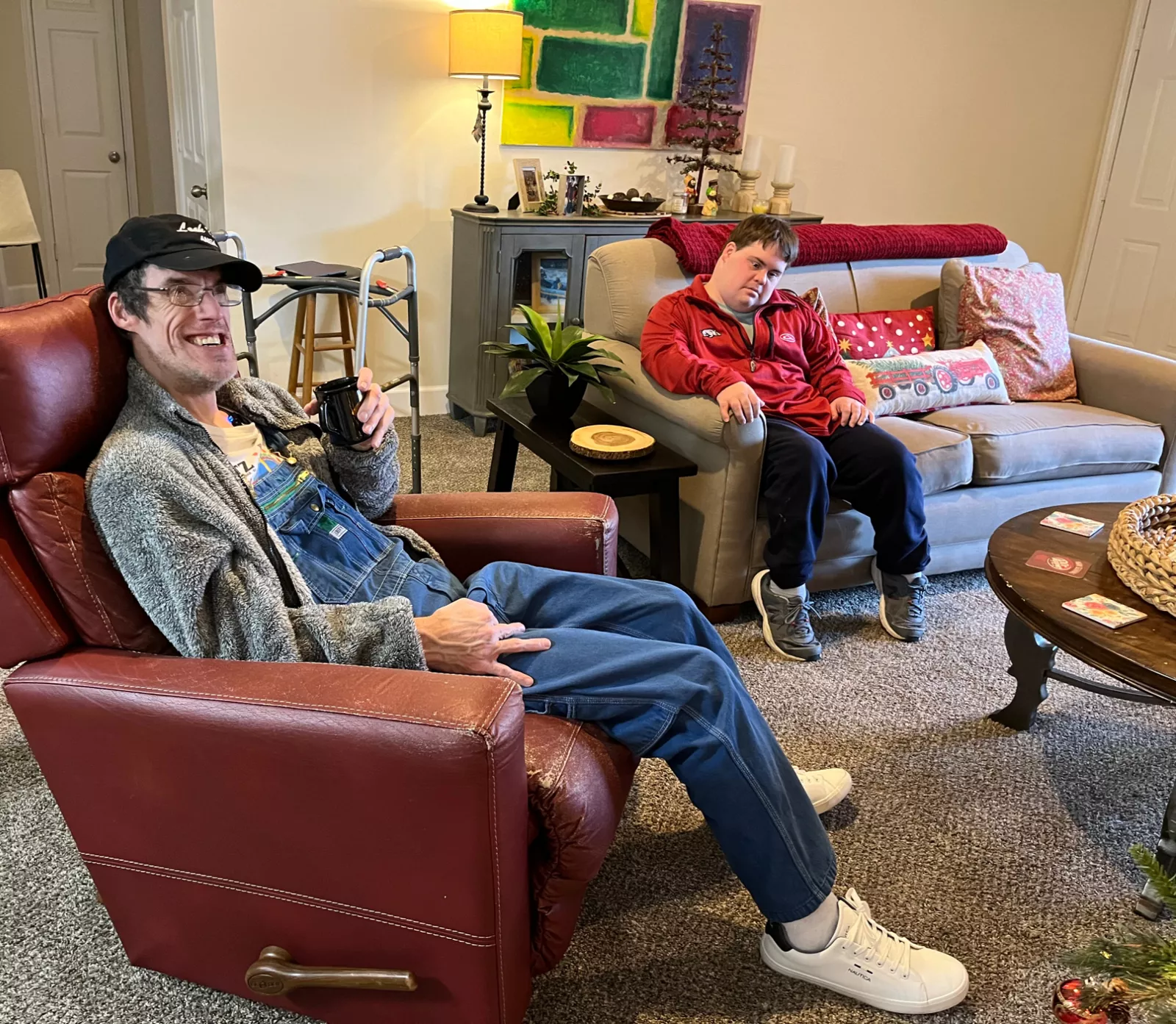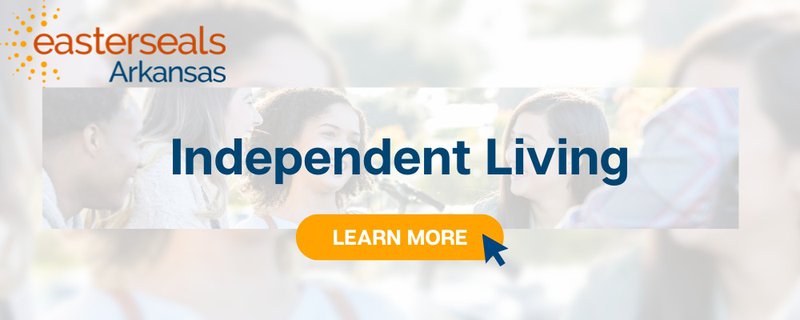
Having a place of your own is a big milestone for everyone. For adults with developmental disabilities, independent living isn’t just a concept—it’s a fundamental pursuit.
However, for these same individuals, this independence often comes with a unique set of challenges. Navigating daily tasks, securing housing and employment, and finding inclusive communities can present significant hurdles.
Easterseals’ Roommate Housing Program opens doors to this kind of freedom.
They recognize these challenges and stand at the forefront of advocating for and facilitating independent lifestyles.
Roommate housing is an excellent option for adults with developmental disabilities who desire to live independently.
Understanding Roommate Housing
Easterseals’ roommate housing is a shared living arrangement for individuals with disabilities. It pairs individuals with similar interests and needs to live together.
In this setup, roommates can learn from each other, share responsibilities, and grow together.
It’s a nurturing environment that encourages personal development, enhanced social skills, and greater independence.
Benefits of Shared Housing
Now you may ask: Why shared housing?
For adults with developmental disabilities, roommate housing offers numerous benefits.
Primarily, it promotes independent living, allowing residents to manage daily tasks with a sense of responsibility and autonomy.
This living arrangement enhances life skills, from cooking and cleaning to managing finances. The residents gain confidence as they navigate everyday challenges in a safe, supportive environment.
Furthermore, it addresses the need for a sense of belonging. These individuals share their journey with others who understand their unique challenges and triumphs. Roommate housing thus becomes a space of empowerment.
Roommate Housing vs. Traditional Living
Traditional living arrangements for adults with developmental disabilities usually involve either living with family members or in specialized residential facilities. These settings often focus on providing basic care and support.
However, this traditional living setup may lack opportunities for personal growth, skill development, and social interaction, potentially leading to isolation.
Roommate housing, on the other hand, offers a community-oriented environment. It’s tailored to meet the specific needs of its residents, providing a sense of security and belonging.
The focus is on compatibility and shared experiences, which are less common in conventional settings. Overall, this approach results in a more fulfilling and enriching living experience for residents.
Things To Consider When Choosing the Right Living Arrangement
When deciding on the right living arrangement for your loved ones, there are key factors to consider. Some of these include the individual’s level of independence, personal preferences, and support needs.
Traditional living options, like family living or group homes, might be more suitable for individuals who require a higher level of support. Adults who are also more comfortable in a structured environment may do well in a traditional living setup.
Conversely, roommate or integrated housing might be better for those seeking independence and social integration. These options offer more opportunities for developing life skills and building social networks.
The Easterseals Arkansas Approach
The roommate housing program at Easterseals Arkansas is designed with the specific needs of adults with developmental disabilities in mind.
The program prioritizes matching roommates based on personality, interests, and living preferences. This meticulous approach ensures a harmonious and compatible living situation.
Ultimately, Easterseals’ goal is to facilitate a smooth transition for these adults to independent living. Their innovative approach to roommate housing just proves their commitment to empowering individuals with developmental disabilities.
Key Pillars of Easterseals’ Roommate Housing Program
The program offers a comprehensive and thoughtfully designed living solution for adults with developmental disabilities. Here’s an overview of its key features:
1. Roommate Matching System
The program uses a detailed questionnaire with 48 questions to pair potential roommates. This process mirrors the way college administrators match dormitory roommates for incoming freshmen.
It covers various aspects, such as personality, lifestyle preferences, conflict resolution strategies, and preferences regarding pets and visitors.
Before finalizing a living arrangement, potential roommates and their families engage in social outings to ensure compatibility. This approach has shown success in fostering close friendships and aiding transitions to community living.
2. Customized Housing Solutions
In collaboration with national and local housing partners, Easterseals secures accessible housing within the preferred community settings of individuals.
Homes typically accommodate two to four roommates, allowing residents to share expenses, technology, and staffing resources. Each roommate signs an individual lease and takes responsibility for their share of rent, utilities, and other household expenses.
Housing adaptations and modifications are made as needed, depending on individual accessibility and safety requirements.
3. Smart-Home and Enabling Technology
The homes are equipped with advanced smart-home technologies tailored to each resident’s needs. This includes smart locks, thermostats, medication dispensers, and phone apps for daily reminders.
Additionally, homes feature remote monitoring technologies like video doorbells, motion sensors, and stove sensors to enhance safety and support independent living.
4. Efficient Staffing and Support Services
Residents receive assistance from direct support professionals tailored to the specific medical, physical, and personal care needs of each home. This includes regular visits from a Community Health Nurse for medication management and overall wellness.
The use of remote monitoring technology also allows for efficient supervision of multiple homes. With this, emergency responses are always available when needed. It also reduces the need for overnight staff.
Application Process and Eligibility Criteria
The roommate housing process at Easterseals is divided into four main phases:
Phase 1: Find a Roommate
The process begins with individuals completing a roommate matching survey to help identify compatible roommates. They then attend social events to meet potential roommates, which helps in determining compatibility.
Participants also identify their available financial resources. Finally, they choose their roommates based on the interactions and survey results.
Phase 2: Develop a Plan
Easterseals assigns a Direct Support Manager (DSM) to each individual. The DSM schedules meetings with potential roommates to develop a more detailed plan.
A tentative plan is created, addressing accessibility, technology, staffing, and transportation needs for the individuals. Personal monthly budgets are also completed to ensure financial viability.
Phase 3: Find a Home
Individuals identify their monthly rental price range and desired location. They then search for and tour various housing options, assessing each for accessibility and technology needs.
Easterseals then assists with hiring or assigning staff as needed for the housing situation. Once housing is chosen, individuals sign the lease agreement.
Phase 4: Move In
The final phase involves finalizing details of accessibility, technology, staffing, and a transportation plan. A complete inventory of household needs is also taken.
To further support the residents, an Adopt-A-House group may be assigned.
Easterseals then submits any necessary plan revisions. Utilities are set up, and finally, the residents move into their new home.
Navigating the Transition
For individuals and families considering roommate housing, the transition requires proactive work in the beginning. But it is highly doable.
Tips for a Successful Roommate Housing Transition
Transitioning into roommate housing can be a significant step towards independence for adults with developmental disabilities. Here are some tips to ease the process:
- Assess readiness: Consider whether the individual is ready for roommate housing, as levels of independence can vary widely.
- Envision a future: Encourage the individual to think about their strengths, needs, and desires for their living situation.
- Practice essential skills: Start developing necessary social skills early, such as respecting personal space and asking permission before using others’ belongings.
Addressing Common Concerns and Anxieties
Moving into roommate housing can bring about concerns and anxieties. Here’s how to address them:
- Open communication: Establish open lines of communication with your roommates right from the start. Regularly schedule times to discuss household responsibilities, share concerns, and celebrate successes together.
- Shared activities: Find common interests and participate in activities together, whether it’s a weekly movie night or a cooking session. This helps create shared experiences and memories.
- Respect boundaries: Understand and respect each other’s personal space and boundaries. Having a clear understanding of what is shared versus personal can prevent conflicts.
- Community involvement: Engage in local events, volunteer opportunities, or clubs to connect with the community. This can also be a way to make new friends and build a support network outside the home.
- Mutual support: Offer and seek support from roommates during challenging times. Whether it’s offering a listening ear or helping with practical tasks, showing support strengthens bonds.
- Responsibility sharing: Divide household chores and responsibilities fairly. This helps avoid resentment and ensures everyone is contributing to the upkeep of the home.
Final Thoughts
For any individual with developmental disabilities, the path to independence is within reach. Roommate housing stands out as a beacon of hope, providing not just a living space but a community and the support needed to flourish.
If your loved one is ready to take this step toward independent living, Easterseals Arkansas’s Roommate Housing Program is ready to welcome you.
To apply or learn more, visit our page for more detailed information.
Take this moment to embrace the opportunities that await your loved ones in independent living. Let them step into a future of independence and community connection.

